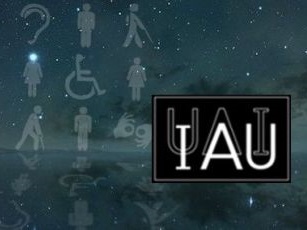 For Global Astronomy Month (GAM) 2017, Astronomers Without Borders (AWB) are teaming up with the IAU Working Group Astronomy for Equity and Inclusion and have compiled a list of thirty resources to be highlighted during April.
For Global Astronomy Month (GAM) 2017, Astronomers Without Borders (AWB) are teaming up with the IAU Working Group Astronomy for Equity and Inclusion and have compiled a list of thirty resources to be highlighted during April.
People with special needs are often overlooked when planning outreach and educational activities and remain a group still frequently excluded from events. The thirty resources highlighted are a free, open source collection intended to support and facilitate the implementation of activities for people with disabilities. The selected best practices, programs, examples of activities, resources and activities guidelines are dedicated to helping outreach and education groups that aim to reach these particular audiences but need more support for doing it.
This collaboration between IAU WG and AWB also intends to be a call for action, to everyone that wishes to implement these activities and wants to know more about how to create and implement resources for people with disabilities. If you want to implement an activity inspired by one of these resources or needs help how to start contact us (Amelia Ortiz-Gil and Lina Canas) and share your ideas, questions and also your experiences with our teams.
We will be highlighting one of these resources every day here, below, and also on our GAM Facebook page and the IAU Working Group Astronomy for Equity and Inclusion Facebook page. The complete list of resources is also available.
April 30 Reach for the Stars presents learners with a new approach to astronomy, one that educates and inspires in ways no conventional materials can hope to match. This interactive book helps students explore the fundamentals of astronomy, the latest scientific advances, the tools that make those advances possible, and careers in science. This resource intends to expose all students—including those with visual impairments and other print disabilities—to critical STEM content. This multi-touch book is designed for your iPad and is available for download from iBooks. Credit: Produced by a collaboration between the Space Telescope Science Institute and SAS.
Read more...
April 29 This is a collection of helpful hints and resources based on seven workshops that offered professional development training and resources for the teachers of students with disabilities, science educators (both formal and informal), and product developers who are working to make Earth and space science concepts more accessible for persons with disabilities. The brochure is a tool for science, technology, engineering and mathematics educators who are working with students with disabilities. Some activity descriptions are supplemented with case study examples addressing a particular disability. Credit: The Southeast Regional Clearinghouse, or SERCH, through the seven workshops "Exceptional Space Science...
Read more...
April 28 Here you can find information that will help you help you make your presentations, talks, meetings, and training more inclusive and accessible to all of your audiences, including people with disabilities and others.
Read more...
April 27 Basics of Astronomy Through Role Play is a handbook for science activists and teachers - describe authors T. V. Venkateswaran, Anshumala Gupta and follows a Role Play technique to explain astronomical concepts not only to children but also adults. These enthusiastic and lively sessions, created in the first person produce lasting impressions on the audiences by promoting the experience of acting and visualizing movements of the celestial bodies.
Read more...
April 26 The Evolving Universe materials have been adapted from the Genesis Cosmic Chemistry: Cosmogony module for use by visually impaired students. The activities are organized using a learning cycle and are intended to be used sequentially in the order they are presented, but they have been designed to be self-contained activities that could be used to emphasize specific scientific concepts or to address specific topics. Evolving Universe material comprehend three activities: Spongy Universe, Our Dynamic Universe and Tracing Origins Thought Experiments. Credit: Adaptive Curriculum Enhancement (ACE) program developed by Mid-continent Research for Education and Learning (McREL).
Read more...
 For Global Astronomy Month (GAM) 2017, Astronomers Without Borders (AWB) are teaming up with the IAU Working Group Astronomy for Equity and Inclusion and have compiled a list of thirty resources to be highlighted during April.
For Global Astronomy Month (GAM) 2017, Astronomers Without Borders (AWB) are teaming up with the IAU Working Group Astronomy for Equity and Inclusion and have compiled a list of thirty resources to be highlighted during April.





